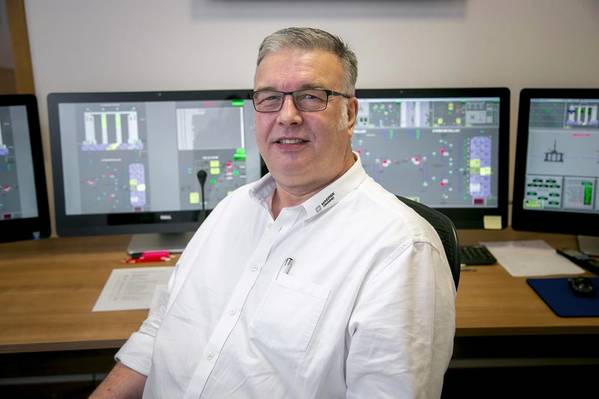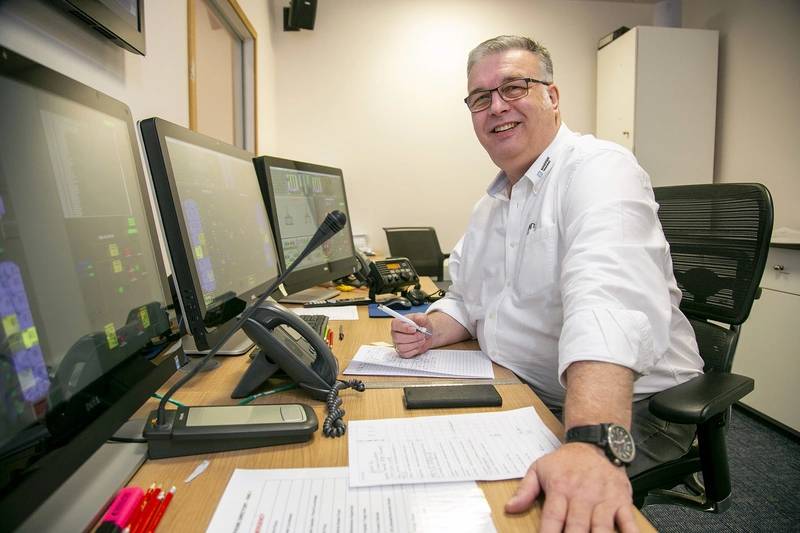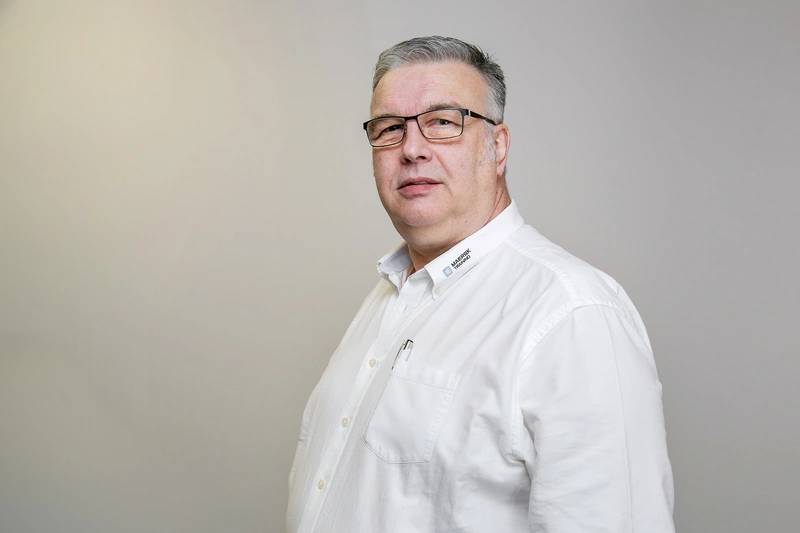
Ken Chapman has led as deep and as broad of a maritime and offshore life as possible, an accrued experience and knowledge including being part of the team that had to coordinated during one of the offshore oil and gas industry’s worst disasters ever: the Piper Alpha. Today he reflects with Offshore Engineer on how these experiences helped drive him into a career in training, today as the Senior Instructor, Maersk Training.
Ken, to start can you give an overview of your career with insights on your current position?
My working life started in the Merchant Navy (MN) (the U.S. equivalent of the Merchant Marine) working for Bibby Line as a deck cadet in 1975. My father was a Captain in the MN, my uncle a Chief Engineer. This choice of the MN was not popular my father and he advised against it, saying the MN was a thing of the past in the UK. As it happened, he was right to a certain extent. By 1979 I was made redundant due to the downturn of the British Fleet. After trying various jobs onshore, I started work with BP as an oil and gas operator in Sullom Voe Oil Terminal. Island life suited me but not my wife, so a change was called for, and I went back to sea working on Standby Vessels and AHTS vessels.
After a year or so there was a downturn in the N. Sea, and I was forced to make another change. This resulted in work onshore in areas different to MN or shipping, but I believe my experience was well-used onshore and led me to join HM Coastguard, based in Aberdeen MRCC, as a SAR coordinator.
This is probably the period that influenced me the most and my future. I was involved in one of the most significant events in the Oil & Gas industry, as I was part of the team that had to coordinate the Piper Alpha disaster; which was probably the worst night of my life and it changed me in so many ways. (*The Piper Alpha offshore rig suffered an explosion on the night of July 6, 1988, claiming the lives of 167 crew members). Although not on the scene, I think the whole team was affected by the events that unfolded that night. Even now, writing about it makes me feel uneasy. However, I have turned negative into a positive and use that training experience in the past and today.
After a few years in HM Coastguard, the industry offshore was picking up, and I was fortunate enough to go back to the industry working on the drilling rigs. Why? Working HM Coastguard was one the most rewarding jobs but was poorly paid. I opted to go offshore, for financial reasons, as a Ballast Control Room Operator in 1990, and for the next 25 years I was fortunate to work for the same employer, albeit in different forms – which is now Transocean.
With Transocean, I held a variety of posts BCO, Barge Supervisor, Rig Safety Training Coordinator. In 2000, I was appointed as HSE Advisor for the North Sea; this job was to bring me ashore and to be honest, I was ready for it. It also allowed me to join a brilliant training team to develop what some people call my ‘baby’, the Multi-Purpose Marine Simulator (MPMS), now known as the Operational Training Simulator in Maersk Training.
During my time as an HSE Advisor we started this project to build the simulator, and it involved a team of people from Transocean and a software firm based in Aberdeen called Pisys. Pisys were superb in putting delivering the vision to bring the various aspects of the Marine side of training in the drilling industry into one complex, rather than farming training out to training providers who delivered a generic set of courses. In 2001, after a $1million investment, my ‘baby’ was born. It was used to deliver Stability courses on Semi Sub Drilling rigs and some basic Jack Up courses, and of course, Major Emergency Management (MEM) courses.
This is where the Piper Alpha’s influence really came home to roost, and training became my passion. Over the years, we developed the simulator to include more semi-subs and Jack- Up models, and under Maersk Training, it can also simulate production platforms, a gas terminal, FPSO, and has the facility to provide training in rig moves. The simulator also, I believe, was the first to demonstrate and train personnel in handling Rack Phase Difference on Jack-Up installations. I believe that Transocean and all the companies that came together to make up the group were way ahead of some in their wish to train their own personnel in their training centers, and I was part of that for nearly 15 years.
During that period in the training department, I developed and trained in various subjects from Marine Operations for Jack-Up installations, Stability for MODU’s, MEM, Advanced courses for Jack-Up such as Jack-Up lessons Learned and was involved in the introduction of assessing all the companies OIM’s and Captains worldwide in the management of major emergencies, this we called the PIC Assessment. And this was all driven by Transocean’s aim to be the best drilling contractor in the world, and I was part of that with my personal wish to make my training the best and prevent another incident like the Piper Alpha.
In 2015 Transocean divested itself of its training centers and handed its training over to Maersk Training globally, and I was passed over with the MPMS to the new company. The transition was not the easiest for me or Maersk Training, but in time they learned from us, and we from them, and I am still here and proud of what we do. In Maersk Training, I have also developed and gained accreditation with certain bodies for the courses I deliver. I have developed courses such as the OIM Controlling Emergencies for other companies assessed in Europe as well as the middle east and developed courses like the Assisted Position Mooring Management Course for Premier Oil.
I intended to retire this year, but after discussion with my manager, we decided that I will instead work on reduced hours. A gentle easing into retirement is better than the prospect of me being at home full time - my wife’s words, not mine!
 Some of the people who come in for training and assessment may not have been in that position of scrutiny for some time, so I always try to make the candidates comfortable. But this does not mean we make it easier. When it comes down to it, I have a personal baseline, “Would I trust this person to look after my loved ones on board a vessel or an installation?” Ken Chapman Senior Instructor, Maersk Training. Photo courtesy Maersk Training
Some of the people who come in for training and assessment may not have been in that position of scrutiny for some time, so I always try to make the candidates comfortable. But this does not mean we make it easier. When it comes down to it, I have a personal baseline, “Would I trust this person to look after my loved ones on board a vessel or an installation?” Ken Chapman Senior Instructor, Maersk Training. Photo courtesy Maersk Training
I can understand how something as dramatic and traumatic as Piper Alpha would be formative in your passion for training.
As mentioned before, the Piper Alpha was a point in my life that changed me. Then, joining Transocean and being given the opportunity to develop the MPMS simulator confirmed that training was what I needed to do. I knew this from training I gave in HM Coastguard, but now this was a chance to do it full time. I believe it is one of the main reason ways can really prevent incidents; how we train people is a key factor. I also believe that if we can get people to do the actual practical training on simulators, it is one of the best ways of learning. Sitting in class and doing theory work is a vital part of it, but if we can get people to do practical work or exercises, it will always reinforce the theory much better than sitting in a class doing a written exam. Of course, there has to be a balance, but if you ask people if they would prefer eight hours day sitting in class or a balance of theory with practical exercises, I think the majority will go for the latter.
Using the start of your career to today as bookends, can you discuss how ‘training’ is most the different, and most the same?
The use of computers and simulators, without a doubt, has been the biggest step forward, and I believe the best improvement. There were not many simulators, possibly radar simulators, and a few ship handling simulators in my early days. These usually made of model ships rather than the high-end graphics we see today on modern computer-based simulators. But as I mentioned, there is still a lot of training that needs to be done in the class. There is no replacement for theoretical education, but blending theory with practical, real-life simulation is the way forward.
What do you consider to be the greatest challenge to deliver and assess effective training?
Adapting to the differing cultures and attitudes I have had the pleasure of working with and ensuring the candidate is comfortable, especially when it comes to assessments and ensuring they are happy with the environment. Some of the people who come in for training and assessment may not have been in that position of scrutiny for some time, so I always try to make the candidates comfortable. But this does not mean we make it easier. When it comes down to it, I have a personal baseline, “Would I trust this person to look after my loved ones on board a vessel or an installation?” Whether it be a written assessment or visual assessment, my goal is to find them competent from the start. Still, if necessary, I will find people who are not yet competent. I always try to have a plan in place for those who need to re-sit their assessment before leaving my care. Hence, they have an idea when and where they will return and what they need to do to improve their situation. It doesn’t always happen, but we try to make the candidate leave with a positive frame of mind.
The offshore industry has been in a prolonged downturn. Can you discuss if and how the downturn impacts your training procedure?
Training in a downturn is not new to me. The oil industry is very cyclic, and yes, this downturn has been the longest and the deepest but you have to recognize that one of the first things companies do during a downturn is to minimize costs, which has usually affected personnel training; nothing required by law is lost. Still, individuals who may be developing their career are sometimes put on hold.
This is where I personally try to step in and help. If I have contact with an individual, I may offer some advice on how they can continue to prepare for courses or assessments to come when the downturn is over. We see signs of improvement already, recruitment is actively picking up, and with the introduction of a vaccine for COVID, I can see our business picking up even more.
In addition, we are using online or virtual training more and more, but again COVID and the downturn has impacted us in numbers. Once we get back to a sense of normalcy, I think online training will stay to a certain extent, but when it comes to us assessing some competencies, I feel we need to have that personal contact.
What long-term changes do you project to training delivery and assessment as a result of the pandemic.
Technology is moving along so fast that the use of video meetings is making the world smaller and bringing us closer to our students in some respects. However, I am old school in some ways as I like to interact with candidates, get to know them and have that personal relationship, however small. But that is me. I am 63, in the twilight of my career, and still learning. The day I stop learning is the day I will retire.
 I was involved in one of the most significant events in the Oil & Gas industry, as I was part of the team that had to coordinate the Piper Alpha disaster; which was probably the worst night of my life and it changed me in so many ways.. Ken Chapman Senior Instructor, Maersk Training. Photo courtesy Maersk Training
I was involved in one of the most significant events in the Oil & Gas industry, as I was part of the team that had to coordinate the Piper Alpha disaster; which was probably the worst night of my life and it changed me in so many ways.. Ken Chapman Senior Instructor, Maersk Training. Photo courtesy Maersk Training